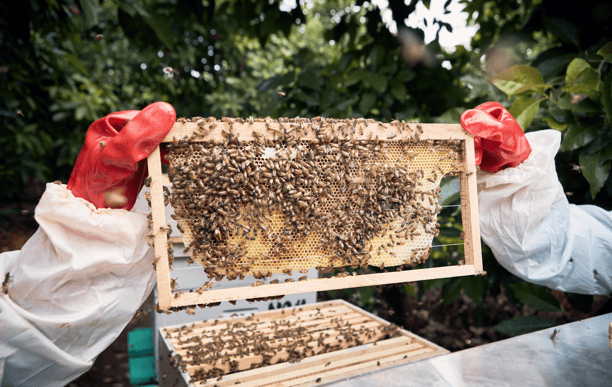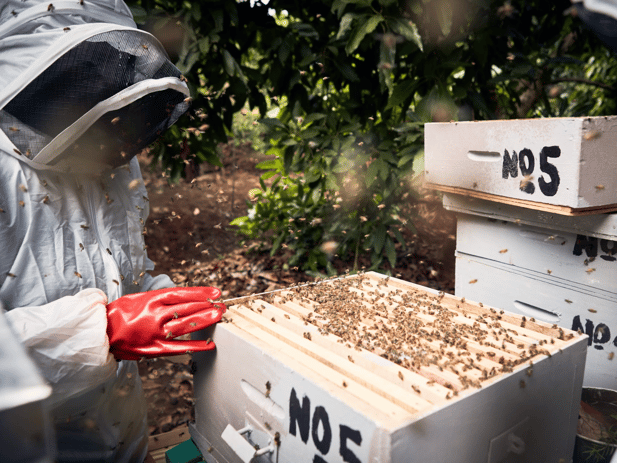- Blog
- green focus
- Protecting...
Protecting bees made easy
May 19, 2023 | written by: Treedom
5 easy ways to save the bees
There are more than 270 species of bees, ranging from honey bees, to bumblebees and solitary bees, in Britain. But why are bees so important to save?
Bees are invaluable to our ecosystems and food production. These pollinators are integral to 90% of the world’s wild flowering plant species, 75% of the world’s food crops and 35% of global agricultural land. They contribute directly to food security, and are key to conserving biodiversity.
There are many measures we can take to protect bees and ensure that more of these furry black-and-yellow insects are buzzing through our gardens again. Here are five things that each of us can easily do in our everyday lives to help protect the bees all year round:
Tip 1: Give bees a home
Bee populations suffer from severe habitat loss in the UK due to the way farmlands have changed to adapt to the population’s needs. 35 UK bees species are under threat of extinction, which makes it even more important to preserve and protect habitats such as meadows, hedgerows, woodlands and other natural areas which provide bees with sufficient food and shelter.
To help combat this, people can provide additional nesting sites such as “insect hotels” and flower strips in gardens, parks and public spaces.
When designing your own garden, it’s important to keep in mind what species will be beneficial to the bee population. Native fruit trees like apple, pear, cherry or plum trees provide an important food source, as the blossoms produce a large amount of nectar and pollen. Moreover, fruit trees usually bloom in spring, when bees are in urgent need of food after a long winter. Conifers or exotic plants produce neither pollen or nectar and are less suitable for bees, so keep that in mind when picking your plants.
Grevillea trees, planted by Treedom in Tanzania, are a bee-friendly plant because their bright yellow flowers attract swarms of hungry bees to pollinate.
Grevillea Tree - available to purchase at Treedom.net, £20.90

The bee colony incubates part of these combs and uses the rest as honey storage. (Photo: Treedom)
Tip 2: Keep bees hydrated
Like most creatures, bees need water to survive.
Help keep them hydrated by creating a small "filling station" on your balcony, garden or windowsill by filling a shallow dish with water and adding a few protruding stones to act as a landing place. Be sure to replace the water regularly so it stays clean. Best of all, other pollinators and birds can also quench their thirst there.
Tip 3: Support local beekeepers
95% of honey in the UK is imported from other countries, which not only contributes to CO₂ emissions, but also poses other risks. Honey blends from overseas can introduce pollen from genetically modified plants and can carry bee diseases caused by antibiotics which can contaminate the honey.
Many bees also die during mechanical harvesting due to large-scale beekeeping. Honey from these industrial productions is mixed from different honeys that are heated and stirred to achieve a uniform, spreadable consistency. This process takes away the freshness, naturalness and key nutrients in the honey. We can counteract this by investing in organic honey from regional beekeepers.
Treedom has collaborated on bee projects in Tanzania, Ecuador and Guatemala where the beehives not only provide a shelter for bees, but the honey produced is sold by local community members.

A beehive built in Tanzania thanks to Treedom in collaboration with our partner Matonyok (Photo: Treedom)
Tip 4: Stop using pesticides
Pesticides and other toxic substances can be harmful to bees and other pollinators. Some ornamental plant sprays and insect sprays contain dimethoate, a strong neurotoxin, which is dangerous for pollinators. To reduce the use of toxic substances, gardeners can use alternative and biological pest control methods, like nettle broth and coffee grounds which help against aphids, while beneficial insects such as predatory mites and ladybirds can eat pests.
Other alternatives to plant sprays with dimethoate include: rock meals, minerals, yeasts or algae products. Plant lovers can also reduce the use of weedkillers by simply leaving little plants like dandelions standing - creating more food sources for insects while protecting the natural ecosystem.
Glyphosate, the active ingredient in Roundup, is one of the most commonly used herbicides in the world by commercial gardeners. However, many pesticides - including insecticides, fungicides, and herbicides - harm pollinators and other beneficial insects.
To help educate those in the farming and gardening industries about this toxic chemical, we've created a comprehensive guide with organic, and homemade; and a second guide with agricultural alternatives. please take a look:
https://www.drugwatch.com/
https://www.drugwatch.com/
Tip 5: Swarm for bees!
It’s clear that we should be doing all we can to protect bees—much of our produce, like almonds, peaches, and cherries, rely on bee-assisted pollination. However, there are still many people who do not know how valuable these little workers are for our ecosystem. Educating children about the benefits of bees from an early age, through children’s books and films, can open their eyes to how important bees are in the long term. Together, families can visit beekeeping centres or make insect hotels to support the local ecosystem. You can access more on the topic through resources like the Bumblebee Conservation Trust or BEES UK.

